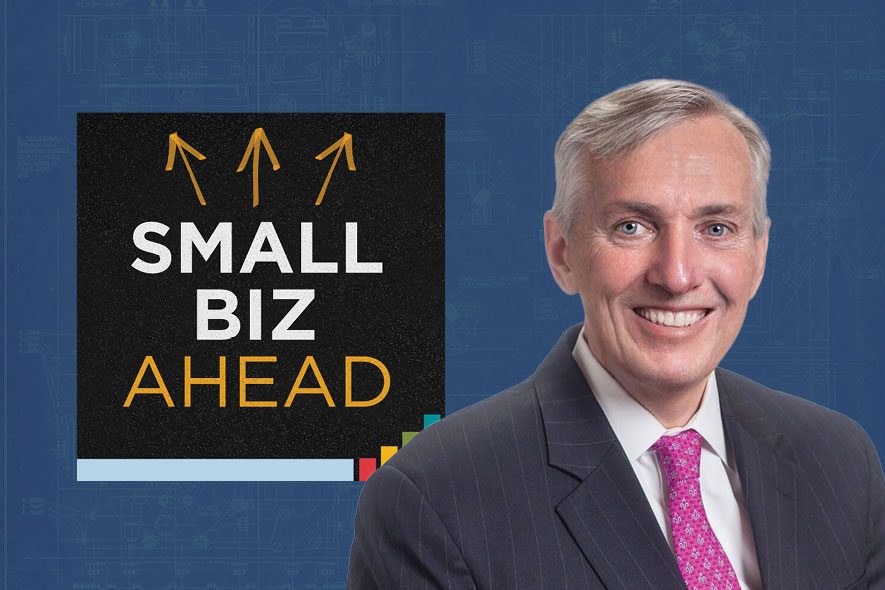Friends are undoubtedly one of life’s greatest gifts. They are the ones who know how to put a smile on your face and how to pick you up when you’re down. There isn’t anything you wouldn’t do for each other. So, going into business with them sounds like the perfect idea, right? Think again. In episode #124, Gene Marks and Elizabeth Larkin discuss the challenges of starting a small business with your close friends.
Executive Summary
1:14—Today’s Topic: Should You Start a Small Business with Your Friends?
2:52—When you go into business with a friend, you are not only getting involved in their financial lives, but also the financial lives of everyone in their family. As a result, the dynamics of your friendship will change once you enter this professional setting.
3:50—It is easier to go into business with a friend who has a different skillset than yours because there will be a separation of duties.
6:25—You and your friend need to create a buy-sell agreement prior to opening your business so that both of you have a clear understanding of all the legal terms and conditions of this professional partnership.
8:20—A buy-sell agreement allows the two of you to check for any potential red flags in advance.
10:35—Gene advises small business owners to always invest in IT training whenever they upgrade their technology; this ensures that all their employees can operate the new system without any difficulty.
Submit Your Question
Transcript
Elizabeth: Welcome back to the Small Biz Ahead podcast. This is Elizabeth Larkin. I’m here with Gene Marks. Today’s topic is about friends, not the TV show. Did you watch the TV show, Friends?
Gene: Friends is one of those show that I never go out of my way to watch, but if I do stumble on it, I’ll watch it. I’ll be like this show is really funny, why don’t I watch this more often? That’s the kind of show. Do you know those guys are still making like millions, each cast member makes millions a year in residuals, still to this day?
Elizabeth: At the end of that show, they were each making a million dollars an episode.
Gene: Yes, something like that, and then they did the whole residual thing and they’re all cashing in.
Elizabeth: It’s funny, too, because people are always like, “Oh my god, that’s outrageous. They’re making so much money.” But do you know how much the studio and the producers are making?
Gene: Sure, I agree. Do you know how much joy and pleasure it gives the viewing public when somebody says a funny joke?
Elizabeth: So much, so much. We’re going to be right back and answer a question about is it a good idea to start a business with your friends? I’m going to say no, but we’re going to hear from Gene after this.
Our Sponsor
This podcast is brought to you by The Hartford. When the unexpected strikes, The Hartford strikes back for over 1 million small business customers with property, liability and worker’s compensation insurance, check out The Hartford’s small business insurance at TheHartford.com.
QUESTION: Should You Start a Small Business With Friends?
Elizabeth: The question that we received anonymously is, is it a good idea to start a business with friends? I don’t know. Obviously I don’t want to say it depends, but it really is an ‘it depends’ question, because there are some friends I think I could start a business with and some friends I couldn’t. Here’s the thing. I have a lot of friends that I have a lot in common with and we would be like, oh my gosh, we should start a business together ’cause we’re both interested in this. Those are the people I think it would probably not be a good idea to start a business with. I have other friends who I have not as much in common with, for instance, my friend I always talk about who’s an accountant, but she’d probably be the best person for me to start a business with because we have completely different skill sets and it would be very, very easy to divide up and say, “I’m going to do this and you’re going to do that.” Whereas my friends that write or work in marketing or do things that I do, it would be much easier probably to communicate with them about, “This is what we should be doing,” ’cause they understand it, but I think we would get into problems with dividing up our duties. What do you think about this?
Gene: I started my business in 1994-
Elizabeth: With your dad.
Gene: With my dad, and then he passed away and I’m still the sole owner of the business. I’ve never brought on anybody else as partners, friendly or non-friendly. Here’s the thing. If you decide to do business with a friend, it’s not the friend that you’re doing business with. You’re doing business with the friend’s spouse and the friend’s kids and the friend’s family and the friend’s life, because what happens when you start doing as a partnership with anybody, you’re involved in each other’s personal lives. You really are, and you’re involved in each other’s financial lives.
Elizabeth: Well, you’re already involved in each other’s personal lives, it’s just now you’re going to be involved in each other’s financial lives.
Gene: A lot different, financial lives, and that’s a big, big deal. It definitely will change your entire nature of your friendship. I don’t advise against it, because I look at it as saying that if two or three people, friends together, feel that they can profit off of each other’s capabilities, then sure, why not join up and do that?
Elizabeth: I can see myself, her name is Nancy and she’s never going to listen to this, but she’s an accountant, she works for a hedge fund. If we discovered, hey, there’s some niche, there’s some need that we can fill, it would be so easy for me to say, “I’ll do all the marketing,” and she’d say, “I’ll do all the financial stuff.” It would be just that much easier and then we could hire people to do the stuff that we don’t know how to do.
Gene: There’s another question about it that when I look at my more successful clients, really the majority of them have multiple owners, because running a business is-
Elizabeth: Stressful.
Gene: It’s stressful and there’s a lot of stuff that you got to do. The multiple owners almost always fall into similar categories. You got the sales person and then you got the operations person. Do you know what I mean?
Elizabeth: Yeah.
Gene: There’s somebody that’s out there schmoozing with the customers and then this other person who’s actually getting the work done. If you’ve got a friend where you’ve got that kind of relationship with and you can have a segregation of duties, I think it’s great. It’s funny, too, because I have much of a less of a problem with that than my wife does. She does not want anybody involved in our lives, and she doesn’t want to be involved in anybody else’s life.
Elizabeth: She’s even more antisocial than you are?
Gene: She makes me me look like Bill Clinton, when it comes to-
Elizabeth: She’s a teacher though.
Gene: She can turn it on, trust me. You’ll never know that, but the minute the day’s over, it’s like forget it, where’s my book? It depends on the friends, again, you are really going to be digging into and really becoming involved in your friend’s personal and financial life, and their spouse and their family and all of that. That does create an issue. For example, if you’ve got a friend and you like the person and you’re thinking of opening, but you don’t like her husband for whatever reason or you don’t trust her husband or whatever, that should be a big concern for you, if you’re going to go into business with this friend because the husbands involved, believe me, the husbands involved.
Elizabeth: That’s why it really easier to go into business with your family, but then it’s also harder because-
Gene: A whole bunch of separate issues, a whole bunch of separate issues. Having said that, people do it all the time. Friends get together and they do their business all the time. They have different skill sets. If you’ve got the right attitude for it, you can absolutely make it work, but again, I keep saying it over and over again, people sometimes miss the fact that it goes well beyond just the friend.
Elizabeth: Is there anyway to safeguard yourself, like any legal, what can you do? Let’s say you have a great friendship. You love their spouse, you love their kids, they love your family, you work great together, all systems go. What do you do to safeguard yourself in case things hit a rough patch?
Gene: Buy-sell agreement is what you have. Every business needs to have it when there’s partners involved. The way that you do a buy-sell agreement is you sit down with your friend, with nobody else around at this point, and both of you lay out all of your concerns. Elizabeth, I love you, I’m really happy to be in business with you. I don’t know if I’m so crazy about your husband. What happens if, I don’t know, he leaves you or what happens if he wants to be more involved? You have to have these open conversations.
Elizabeth: You do this with a lawyer?
Gene: No, what happens with a buy-sell agreement, like any good contract, is that the parties involved do the deal, and then they bring the lawyers in later to write it up and make it legal. You should be sitting down with your friend and also agreeing, when it comes time, what percentage of the business should we each be owning? What happens if you die or I die? What happens if you want to get out? What happens if you get divorced? What would you like to see happen, in other words? Do you know what I mean?
Elizabeth: Yeah.
Gene: You both take notes on that and write it down, and then you both go to an attorney and say, “We’ve talked this out.”
Elizabeth: Separately?
Gene: No, no, together, I think, ’cause you can have separate attorneys to represent yourself individually for individual matters, but you’re going into a business and so it should be a joint thing and say, “Listen, we’re going in, we’ve talked this out. We’re going to have a buy-sell agreement. This is what’s important to us. Can you please write this up?”
Elizabeth: I think what’s really smart about that is that if you do that, and your potential business partner says something to you that just comes out of nowhere-
Gene: Rubs you the wrong way, good to know it now.
Elizabeth: … and it really bothers you-
Gene: Good to know it now.
Elizabeth: … that’s maybe a good time to be like … I don’t know.
Gene: I’ve had clients that they’re going to go into business, I’m thinking in particular there was two people that were going to go into business together, and one of the guys was saying, “Well, if anything were to happen to me, I’d want my wife to take over. I owe that. I want to make sure she’s whatever.” The other partner was like, “Well, I don’t want to be in business with your wife. I want to be in business with you. That’s a problem.” Good to know that before you start out.
Elizabeth: So what’d they do?
Gene: I don’t know if they ever came to an agreement in the end. You really do want to have this down in writing.
Elizabeth: You really need to know what’s going to happen if one or both of you dies?
Gene: Yeah, absolutely, you need to be talking about it, or if one or both of you gets into legal trouble, or if one or both of you … I had another client, there were three partners, one of the partners was actually having an affair with an employee in his office.
Elizabeth: Oh my god.
Gene: It was really bad. They were like what do you do? Can we fire you? You’re one of the partners? This woman, she’s threatening a lawsuit because whatever, it was a messy thing.
Elizabeth: What a disaster.
Gene: Yeah, it’s a messy thing. You have to think about all those things and agree together what each of you want to see happens, and then you go back and you have an attorney then … By the way, when the attorney writes up the buy-sell, the attorney then advises you on certain things. “Well, I would advise that we handle it in this way or we write it up in this way.” But you want to tell the attorney what you want to do, not the other way around.
Elizabeth: Okay. We’ll be right back with Gene’s Word of Brilliance.
WORD OF BRILLIANCE: Training
Elizabeth: And we’re back with Gene’s Word of Brilliance.
Gene: Training.
Elizabeth: Training.
Gene: Training, training.
Elizabeth: Sorry, I jumped you there.
Gene: It’s the number one thing that’s forgotten about when people buy technology. I’m in the technology services business, Elizabeth.
Elizabeth: So you’re a little invested in talking about this.
Gene: I am, and people buy software or they pay a lot of money to have it customized or integrated or migrated with the data and all that kind of stuff. Then they leave over like $2 for training. When in the end your employees need to be able to have a resource and they need to be able to figure out how to use the software, and then also make sure that they’ve got the support when they want to answer questions. Whenever we advise clients when they’re buying, you’ve got to, whatever you’re buying software-wise, particularly if it’s a company-wide thing, as part of your budget, you have to include a training budget part of it. I’ve seen it, when clients to that, they succeed with technology. When they don’t do that, people are just paddling around.
Elizabeth: Okay, that’s going to do it for us this week on the Small Biz Ahead podcast. Next week we’re going to talk about how to properly interview someone. We actually got this question on Small Biz Ahead. We were talking about all the mistakes you can make when interviewing someone, so next week we’re going to talk about how to actually properly interview someone.
Gene: I’ve got a great book to recommend as well.
Elizabeth: Wonderful.
Gene: Actually I think it will help you as a business owner, fantastic book.
Elizabeth: Okay, we’ll be back next week with our next episode. Thanks for listening.
Download Our Free eBooks
- Ultimate Guide to Business Credit Cards: The Small Business Owner’s Handbook
- How to Keep Customers Coming Back for More—Customer Retention Strategies
- How to Safeguard Your Small Business From Data Breaches
- 21 Days to Be a More Productive Small Business Owner
- Opportunity Knocks: How to Find—and Pursue—a Business Idea That’s Right for You
- 99 New Small Business Ideas





